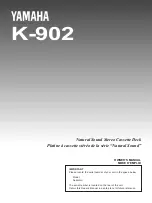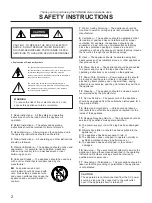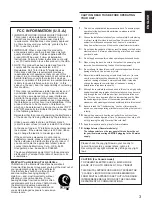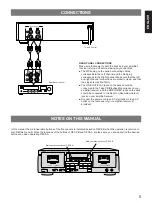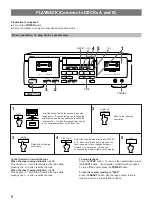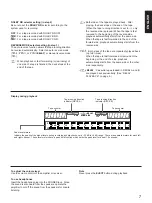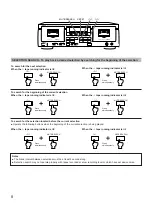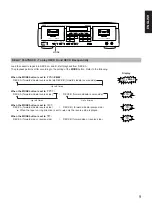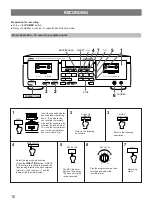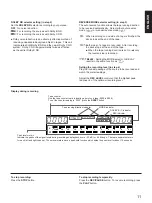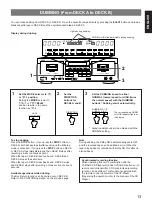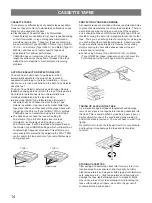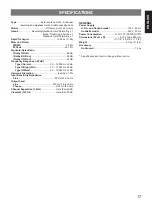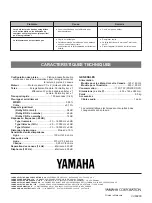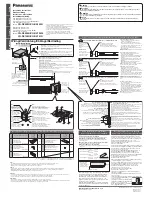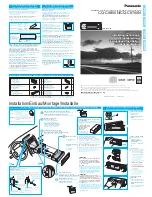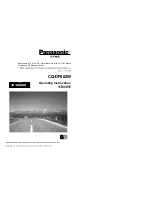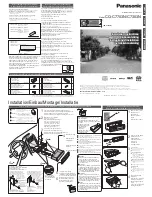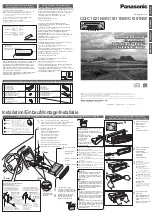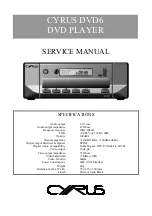
13
ENGLISH
FRANÇAIS
DEUTSCH
SVENSKA
ITALIANO
ESPAÑOL
DUTCH
DUBBING (From DECK A to DECK B)
1
2
Set the MODE selector to
or
position.
Setting the MODE selector to
or
RELAY
position results in the same
function as
.
Set the
DIRECTION
buttons for
DECKs A and B.
3
Set the DUBBING speed to either
NORMAL (normal speed) or HIGH (twice
the normal speed) with the DUBBING
buttons*. Dubbing starts automatically.
DUBBING A
#
B
NORMAL HIGH
The corresponding NORM
or HIGH indicator lights on
the display.
* Higher quality sound will be obtained with the
NORMAL setting.
Synchronized recording function
When operating this unit in combination with the
YAMAHA CD Player which has SYNCHRO button on its
remote control transmitter, CD Synchronized recording
function can be utilized. This function is operated with
the remote control transmitter of the CD Player.
(Regarding the operation, refer to the manual of the CD
Player.)
Note
During dubbing, the Dolby NR is automatically set to OFF
and the recorded tape can be dubbed as it is. (When the
tape to be dubbed is recorded with Dolby NR, this effect is
also dubbed.)
To stop dubbing
Press the STOP button. (If you press the STOP button on
DECK B, both decks stop simultaneously and the dubbing
mode is cancelled. If you press the STOP button on DECK
A, DECK A stops immediately and then DECK B stops after
recording a 4-second blank section.)
When the tape in DECK B reaches its end, DECK B and
DECK A stop at the same time.
When the tape in DECK A reaches its end, DECK A stops
and DECK B stops after providing a blank section of about 4
seconds.
Available operations while dubbing
The Rec Return function can be carried out on DECK B.
Refer to “REC RETURN operation” on the previous page.
You can make dubbing from DECK A to DECK B. Open the cassette compartments by pressing the EJECT buttons and load a
blank cassette tape in DECK B and the original cassette tape in DECK A.
NATURAL SOUND STEREO DOUBLE CASSETTE DECK K-902
DOLBY NR
OFF/ B/ C
REC LEVEL
0
10
1
9
2
8
3
7
5
4
6
PHONES
DIRECTION
POWER
MODE
O
/
p
/
∏
/ RELAY
!
PLAY
⁄
STOP
MUTE/SEARCH
EJECT
NORMAL
HIGH
DUBBING A
#
B
!
PLAY
⁄
STOP
MUTE/SEARCH
REC/PAUSE
EJECT
RESET
RESET
DIRECTION
PLAYBACK
DECK A
RECORD/PLAYBACK
DECK B
3
2
1
¤
30 dB
–
A
NORM
‹
R
L
20
15
10
8
6
4
2
0
2
4
6 +
¤
B
‹
RELAY
REC
DUB
HIGH
REC
B C
Lights during dubbing.
NORM or HIGH indicator lights during dubbing.
MODE
“
/
[
/
”
/
RELAY
DIRECTION
Display during dubbing

